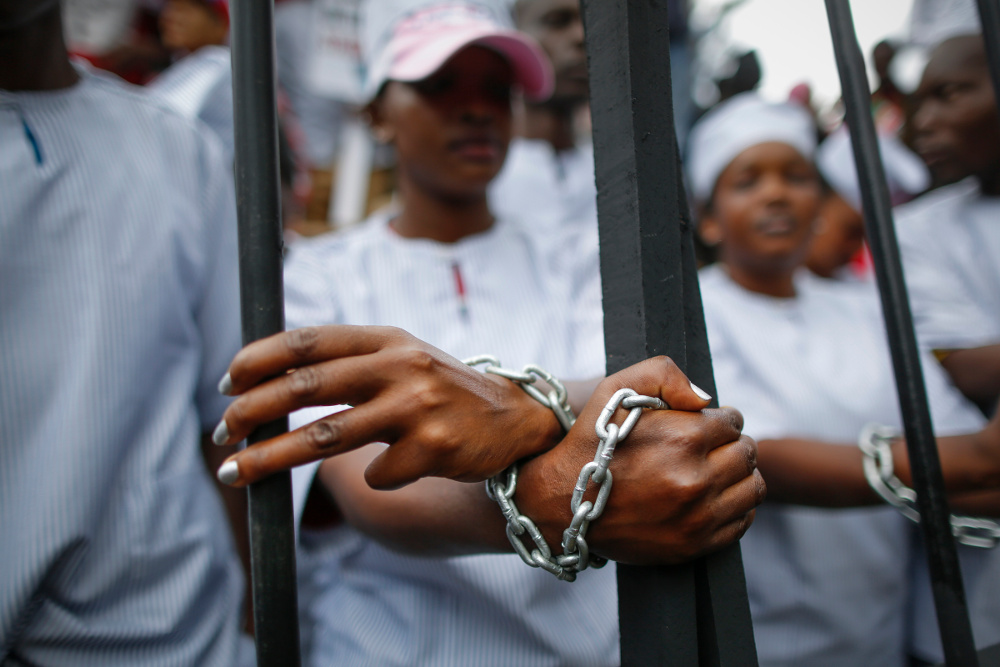
Protesters in Nairobi, Kenya, wear mock prison uniforms and stand behind a false prison to demand that corrupt government officials be jailed Nov. 3, 2016. (CNS/EPA/Dai Kurokawa)
Editor's note: Following is a plenary talk given July 28 by Fr. Charles Curran to a conference of about 500 moral theologians and ethicists in Sarajevo, Bosnia and Herzegovina, gathered to consider the theme "A Critical Time for Bridge-Building: Catholic Theological Ethics Today." Curran, the Elizabeth Scurlock University Professor of Human Values at Southern Methodist University, spoke about the need for Catholic ethicists not only to identify right and wrong but also to work for justice in the world.
In this significant conference we are talking about contemporary moral problems we are facing in the world today such as corruption, ecological devastation, and climate change. My charge is to develop what the Catholic moral tradition has to say about these and similar problems. I will often refer to these problems using the broader phrase of justice, peace, and the integrity of creation. I propose that Catholic tradition at its best has three important considerations that bear on dealing with these moral problems we are facing today. 1) It is not enough just to determine whether an act is right or wrong, but there is a need to make what is right more present in our society. 2) The consideration of the morality of acts is not enough. Attention must be given to the person who can bring about change. 3) Other actors based on the principle of subsidiarity.
Determining what is right or wrong is not enough
Catholic moral theology should be understood not only as determining whether acts are right or wrong but also with the need to bring about change so that what is right becomes present in our society and justice replaces injustice. In this aspect, Catholic moral theology differs somewhat from moral philosophy or moral ideas. Yes it is important to be able to show through human reason what is right or what is wrong. But reason or ideas are not enough to bring about change on a particular issue. They are necessary but not sufficient.
Take, for example, the case of bribery that is an important part of the broader issue of corruption and is so present in all parts of the global society today. A bribe is an inducement improperly influencing the performance of a public function meant to be gratuitously exercised. John T. Noonan, Jr., years ago published an exhaustive 839-page treatise — Bribes: The Intellectual History of a Moral Idea. The title very accurately describes how Noonan deals with the idea of bribes. His concluding chapter discusses the future of the bribe. Noonan concludes that four reasons will likely continue to make sure that bribes are morally condemned. 1) Bribing is universally shameful. 2) Bribery is a sellout to the rich. 3) Bribery is a betrayal of trust. 4) Bribery violates a divine precept. Deuteronomy 10:17 maintains that God does not take bribes. [1]
The Catholic tradition itself has not always recognized the important need to go beyond the morality of acts to attempt to bring about change in a concrete way with regard to existing practices. The manuals of moral theology had the narrow scope of declaring which acts are sinful and the degree of sinfulness. They express no interest in how to change practices such as corruption or bribery. It was enough just to point out what was the law of God about sinful acts.
Catholic social ethics and teaching by its very nature aims at making justice more present in society. Even here the emphasis for some time was heavily on teaching what is the right thing to do, but recently that has been changing. The Pastoral Constitution on the Church in the Modern World decried the split between faith and daily life. There can be no false opposition between professional and social activities on the one hand and religious life and belief on the other (n. 43). The International Synod of Bishops in 1971 insisted that "action on behalf of justice and participation in the transformation of the world fully appear to us as a constitutive dimension of the preaching of the Gospel, or, in other words, of the Church's mission for the redemption of the human race and its liberation from every oppressive situation." [2]
Liberation theology recognized the need to free people from social, political, and economic oppression and proposed means to bring this about. The emphasis on sinful structures called for Christians to work concretely to change and eliminate this structural sin.
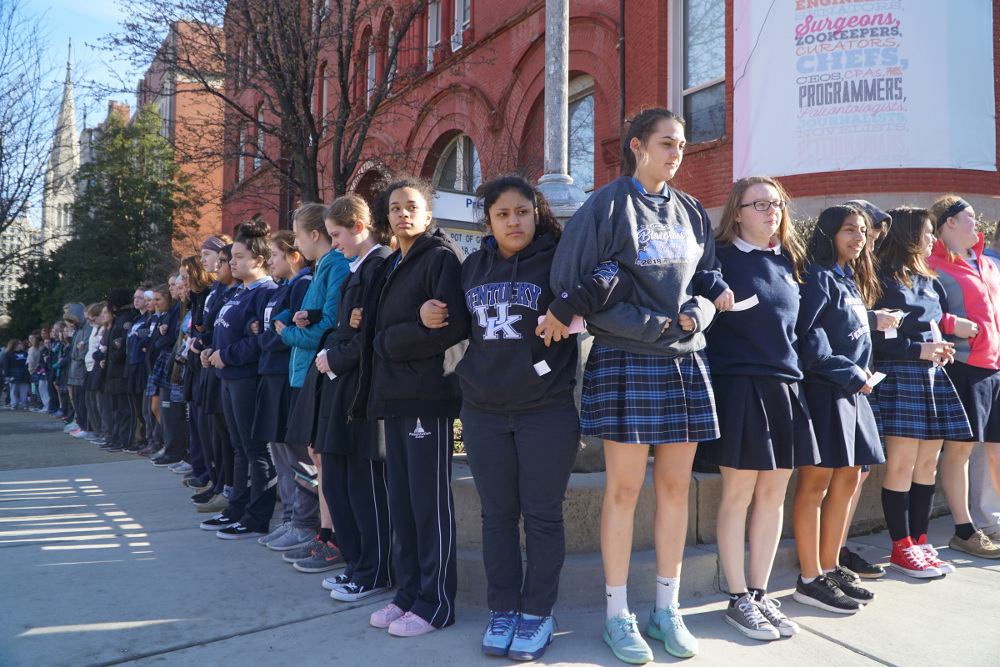
Presentation Academy students stand arm in arm on the sidewalk in downtown Louisville, Kentucky, after walking out of class March 14 to call attention to gun violence. (CNS/The Record/Marnie McAllister)
Catholic social ethics involves not only orthodoxy (right teaching) but also orthopraxis (right practice). The Catholic tradition thus has to be concerned with the concrete ways of overcoming injustice and making justice, peace, and the integrity of creation more prevalent in our local, national, and global realities. Today moral theologians are more conscious of their responsibilities in this area of bringing about social change through more than just teaching what is right or wrong.
In my country, one example of this is the theological recognition of the role of community organizations to bring about change and greater justice in our society. The United States claims to be a democracy, but many people feel they have no power or role to play in our society. They are truly passive and do not participate or become involved, and in fact are estranged from the broader society. For the most part, they do not even bother to vote. They have given up on any possibility of bringing about justice and change. Community organizations attempt to organize the poor and marginalized to show that they by their organized efforts they can bring about change and make justice more present. Community organization does not involve privileged people telling the underprivileged what to do. By definition such organizations try to find the local leadership within a community and encourage that leadership to discern among the people what are the primary problems of injustice they are facing. They then discern what are the best ways to try to bring about change. Community organizers recognize that especially in the beginning it is very important for marginalized communities to have the experience that they can bring about such change. Such small successful attempts encourage them to move forward in many other directions. By encouraging the important role of community organizations, Catholic theologians help to show concrete ways in which injustice can be overcome and social structures can be changed in a more just direction. [3]
One can readily see why Catholic social ethics should be concerned about the concrete ways of bringing about justice and overcoming sinful social structures. What has often been called personal ethics such as bioethics is usually distinguished from social ethics and concerns itself with the narrow confines of the discipline. Recently Lisa Sowle Cahill has objected to such a distinction and bifurcation. Cahill calls for participatory discourse in bioethics. [4] Contemporary Catholic bioethics often engages in narrow ethical discourse (Is artificial hydration in these circumstances right or wrong?) and policy discussions about what should be the public policy on these issues. But this is only one sphere of social action open to theological and religious ethics. Heretofore theological bioethics has too readily conceded the playing field to those who define ethics in policy discourse terms that are essentially the terms of liberal democratic personalism. Thus Catholic bioethicists by following the general approach in American bioethics have forgotten about the equally or more important avenues of reform.
Catholic bioethicists must also deal with practices and movements in civil society that can have a subversive and revolutionary impact on bioethics, science, and capitalism. The practice of medicine and the provision of healthcare in our American ethos are generally becoming scientific rather than humanistic enterprises and are primarily directed by marketplace values. Justice in medicine and access to preventative and therapeutic care are increasingly seen in this ethos in terms of individual rights and liberties with their emphasis on autonomy and informed consent. Theological bioethics, on the other hand, even when translated into secular terms and categories, should give priority to distributive justice, solidarity, the common good, and the preferential option for the poor. Participatory theological bioethics must turn its attention more firmly to social ethics and to political grass roots, midlevel, nongovernmental and governmental levels. Cahill appreciatively describes the role of the Catholic Health Association in working on all these levels for a more equitable healthcare system. [5]
Advertisement
Contemporary Catholic theology recognizes the existence of structural sin that needs to be changed. As structures they are complex realities involving many different aspects. As sinful they are not easily changed. Simply saying that something is wrong will not bring about change.
Fr. Bryan Massingale's discussion of racism well illustrates the complex reality of racism and the difficulty in trying to change such structures. The common sense understanding of racism sees racism as personal acts of rudeness, hostility, or discrimination usually against persons of color, but an emphasis on personal attitudes and actions cannot explain the depth of racism and its persistence in U.S. society. Massingale sees race as a cultural phenomenon involving a set of meanings and values that forms the life of a community. Culture provides the ideological foundation for social, political, and economic policies. Racism is a largely unconscious reality developed through cultural conditioning and instilled by socialization. The culture of racism masks the indignities, discrimination, hostility, suspicion, and rejection that black people experience just because of the color of their skin*. They are not accepted in the same way as white people are in practically all aspects of social existence in this country. White culture is an often unconscious awareness that accepts whiteness as the measure of what is real, standard, normative, and moral. White privilege involves the uneven and unfair distribution of power, privilege, land, and material resources favoring white people. [6]
To be effective against racism, Catholic ethical reflection must adopt a structural and systemic approach recognizing the social evil as a cultural phenomenon of our underlying color symbol system that justifies race-based disparities and shapes a person's consciousness and identity although usually on an unconscious level. To overcome racism requires changing white privilege, advantage, and dominance. [7] Massingale's understanding of racism provides a very clear understanding of the complexity of structural sin and the difficulties in striving to overcome it.
In discussing immigration, Kristin Heyer recognizes that the best moral and political arguments in favor of the rights of immigrants are necessary but not sufficient. [8] We are dealing here with structural or social sin. Like Massingale, Heyer refers to this reality as scotosis. We need to recognize the unconscious dimension of social sin and the impact unjust structures have on moral agency. There is a dialectical relationship between personal and social sin. Social structures are both consequential and causal in nature. Persons help to create sinful social structures by their actions, but sinful social structures greatly influence human agency.
Socioeconomic, cultural, and political structures opposed to immigration are connected to ideological blindness. Pride, insecurity, ignorance, and group egoism contribute to these structures opposed to hospitality to immigrants. Group egotism, to use Reinhold Niebuhr's phrase, contributes to cultural forces that elevate national or security concerns above moral ones, thus contributing to the rise of human rights violations and callous indifference to immigrants.
These intertwined problems of social sin require repentance, conscientization, and radical conversion. The lens of individual culpability does not address the social sin of opposition to the human rights of immigrants. Radical solidarity is required to reframe immigration as a shared international responsibility and to cultivate conversion from the existing pervasive ideologies.
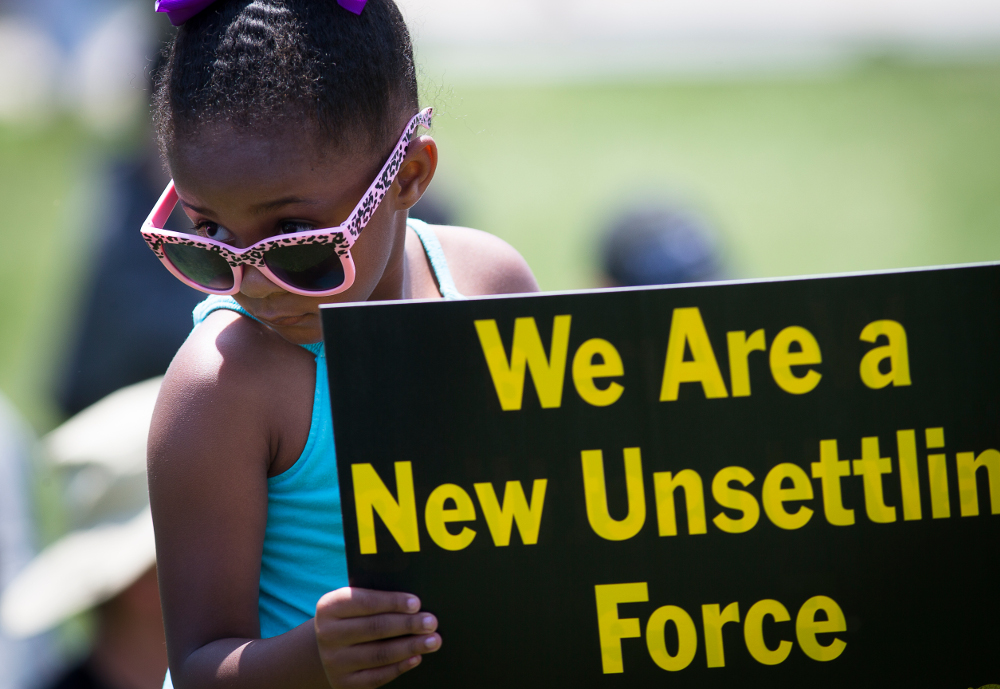
A girl is seen near the Capitol in Washington May 21 during a Poor People's Campaign protest to combat systemic racism. (CNS/Tyler Orsburn)
The human act must always be considered
In the Catholic tradition, sinful human beings need God's grace in order to act as the children of God. Thus the change of heart is a most important reality for the development of Catholic moral theology. The manuals of moral theology, however, gave little or no consideration to the need for a change in the person with the emphasis always on human actions and not on the person. Here there exists a fascinating tension between the older manuals of moral theology and the older manuals of dogmatic theology. The manuals of dogmatic theology defend the thesis that sinful human beings without grace are not able to observe over a long period of time the substance of the natural law. [9] In other words, conversion or a change of heart is necessary for us to live out over time the full requirements even of the natural law. But for all practical purposes the manuals of moral theology paid no attention to this teaching found in the manuals of dogmatic theology.
The Catholic tradition as illustrated in the work of Thomas Aquinas recognized and even emphasized that acts must be seen in relation to the person and the virtues of the person. But even here for many scholars especially in my country in the late 19th and the first half of the 20th century, Thomas Aquinas was seen and studied primarily as a philosopher and not as a theologian. [10] Recently theologians have made the case that Aquinas was and remains a theologian and not just a philosopher. [11]
Aquinas developed what is today called moral theology in the Ia IIae of the Summa. The very last treatise here is grace (qq. 109-114). Grace is necessary to do the works of Christian charity and love. Without grace fallen human beings can do some good acts of the natural law since sin does not totally corrupt human nature, but the human without grace is like the sick person who can do certain actions but not all the same actions that the person in perfect health can do. In other words, even to do the works of the natural law easily and in its totality the human person needs grace. To use the biblical words here, one needs conversion.
Aquinas is well known for his treatise on natural law. Many volumes and even some libraries are dedicated to Thomistic natural law theory, but Aquinas devotes only one question to natural law (Ia IIa q. 94). Very few books on Aquinas's ethics have mentioned the New Law, but the Summa devotes three questions to the New Law (106-108). The New Law is not a written law but rather it is primarily the gift of the Holy Spirit dwelling in our hearts.
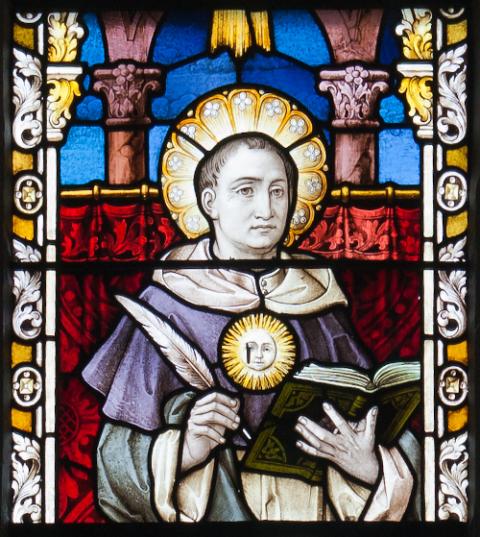
Detail of a stained glass window depicting St. Thomas Aquinas at Sts. Peter and Paul's Church, Clonmel, County Tipperary, Ireland. (Wikimedia Commons/Andreas F. Borchert)
In addition to the role of grace and the New Law, Aquinas spends most of the Ia IIae on the role of virtues which are the good habits disposing us to do what is right. Aquinas says the virtues modify the basic powers of the human person — intellect, will, concupiscible and irascible appetites to do the good. I prefer to see the virtues modifying the basic human relationships to God, neighbor, world of creation, and self. Here too with regard to the virtues Aquinas sees the important role of the infused virtues enabling the Christian to carry out the supernatural works of charity. One does not have to agree with all of Thomistic anthropology to appreciate the importance for right actions of the human person to be transformed by grace and the infused virtues in order to live out the fullness of the Christian and human life. Contemporary Catholic moral theology has insisted on the important role of the virtues.
The formation of the human person as subject and agent is most basic in carrying on the work of justice, peace, and the integrity of creation. The fundamental change of heart and the virtues relating the individual to God, neighbor, world of creation, and self insist that the human person is not an isolated monad.
In my country the greatest difference between Christian anthropology and the American ethos is the individualism that is so prevalent in the United States. In a classic study, Robert Bellah and coauthors describe two kinds of individualism in the United States. Utilitarian individualism sees all other persons and things simply as means for the good of the individual. Expressive individualism insists on the need for the individual to be free at every moment to express oneself in whatever way one wants. According to this sociological study, the primary language heard in the United States is the language of individualism. So strong and pervasive is the individualistic ethos that even people who in their lives show great concern for others, the poor, and the common good often use the language of individualism to explain what they are doing. They do not have any other way to describe their own broader commitments. [12]
In opposition to such individualism, the Christian ethos insists on the common good, the solidarity of all creatures — human beings among themselves and in relationship to the environment — and the preferential option for the poor. The Catholic tradition today not only recognizes political and civil rights such as the right to religion, speech, press, and assembly but also social and economic rights such as the right to food, clothing, shelter, education, and healthcare. A major tragedy in the United States is the fact that we are the only highly developed country without universal healthcare. Justice in the United States is usually seen in terms of the relationship of one individual to another, but the Catholic tradition insists on distributive justice involving the relationship of society or the state to the individual as seen for example in the just distribution of material goods in society and legal or participative justice which recognizes the relationship of the individual to society and the state and that calls for active participation of all in the broader society. Restorative justice from the Christian perspective aims at restoring the relationships in society that have been broken by sin.
From the perspective of Catholic moral theology, individuals striving to live out the love of God and neighbor aided by the appropriate virtues are basic in doing the work of justice, peace, and the integrity of creation. The role of the individual person, however, is necessary but not sufficient. What else is required?

A tractor passes by a wind turbine that was built to provide power to the town of Greensburg, Kansas. (CNS/EPA/Larry W. Smith)
Other actors based on the principle of subsidiarity
The Catholic social tradition has developed the principle of subsidiarity, which serves as a guide for how to bring about change in society. The principle of subsidiarity recognizes an important but limited role of government in trying to ensure justice in society. However, between the individual and government are what others have called mediating institutions. [13] The basic Catholic view of society looks something like this. At the very basis of society stands the human person with God-given dignity and rights. The human person is prior to the state and cannot be subordinated to it. Next comes the family, which is the basic unit of society for the development of human beings. On the next level are institutions or structures such as neighborhoods or extended families. We live in and through all these realities. Then come somewhat independent structures and institutions that are necessary for any society. Think for example of the role of the press and the media. Cultural institutions of all kinds abound for the higher goods of the individual. Educational institutions of great variety exist to foster the education of all the citizens. Religious groups, mosques, and churches bring together people for religious purposes with a recognition that religion also has a role in working for justice, peace, and the integrity of creation. Other groups that people freely join are called voluntary groups such as Doctors Without Borders, Union of Concerned Scientists, and Habitat for Humanity. Only then comes the limited role of government.
In issues of justice, peace, and the integrity of creation, government has a significant role but not the only role. Governments usually have laws against bribery and corruption. There are also laws to protect the environment and to avoid disastrous climate change. Many governments have mileage and emissions standards for automobiles in order to protect the environment. In addition to laws and regulations, government can provide incentives to influence more people to carry on the work of social justice.
The voluntary associations described in the principle of subsidiarity can promote a culture or ethos to support the work for justice, peace, and the integrity of creation. Such an ethos plays an instrumental role in supporting existing government regulations, but such a culture also has an independent role to play in society. An ethos of honesty and transparency makes it easier for individuals to avoid the temptations of bribery and corruption. A culture of concern for the environment helps individual citizens to become more involved in the work of protecting and sustaining the environment. Voluntary recycling can help motivate others to follow the example and thus make their contribution to the good of the environment.
What are the institutions in society that can help to bring about such a culture? Educational institutions have a big role to play in making society and individuals aware of the important needs in these areas. The free press can promote social justice and serve as a watchdog to point out the problems created by bribery and corruption. Religious groups contribute to such a culture by stimulating their adherents to become more involved in the work of justice, peace, and the integrity of creation. There can be different and at times even conflicting ways to carry out these policies. There might even be a few people opposed to some of these efforts on behalf of justice, peace, and the integrity of creation, but they can and should be drowned out by the vast majority of people who seem willing to support these measures. A very important type of voluntary association that has come to the fore recently involves nongovernment organizations (NGOs). They have already had a significant effect in working for justice, peace, and the integrity of creation throughout the globe.
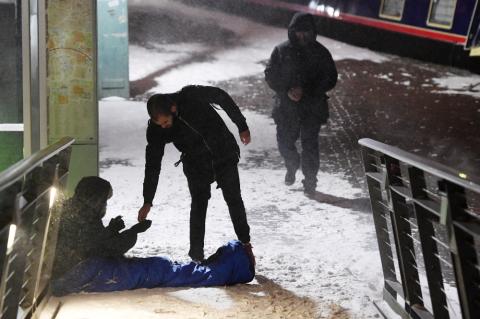
A man gives a homeless person money March 1 in Birmingham, England. (CNS/EPA/Facundo Arrizabalaga)
Conclusion
Catholic moral theology has a significant role to play in working for justice, peace, and the integrity of creation on the local, national, and global levels. This role today involves more than just determining what acts are right and what acts are wrong. The struggle for social justice involves the need to make just structures and institutions more present in society. Often such a focus will call for changing existing unjust structures. Structural change by its very nature is complex, involving many different factors and relationships, and consequently is not easily accomplished. From the theological perspective these unjust structures are seen as sinful structures. As a result they are even more difficult to change. Full justice and peace will never be present in this world, but moral theology has a role to play in pointing out the concrete ways in which some progress can be made in these areas.
The principle of subsidiarity in the Catholic tradition provides an approach to bring about such change. The principle of subsidiarity in its own way is a good illustration of the Catholic tradition's insistence on a "both-and" approach. The role of the individual seen in terms of multiple relationships is most fundamental but itself is not adequate. Government too has a significant role to play, but it too is limited. A very important function belongs to mediating institutions and voluntary associations that try to change structures as well as the ethos and culture of society. In short, to carry out the work of justice, peace, and the integrity of creation we need committed individuals, mediating institutions, voluntary associations, and government. But, all these actors need to try to overcome the sinful social structures that support many of the problems facing society today.
[Fr. Charles E. Curran is the Elizabeth Scurlock University Professor of Human Values at Southern Methodist University.]
* This story has been updated to correct an erroneous word resulting from a typo.
[1] John T. Noonan, Jr., Bribes: The Intellectual History of a Moral Idea (Berkeley, CA: University of California Press, 1984), 702-05.
[2] Synod of Bishops 1971, "Justice in the World," in Catholic Social Thought: The Documentary History, ed. David J. O'Brien and Thomas A. Shannon (Maryknoll, NY: Orbis, 2010).
[3] Jeffrey Odell Korgen, Beyond Empowerment: A Pilgrimage with a Catholic Campaign for Human Development (Maryknoll, NY: Orbis, 2005); Bradford E. Hinze, Ecclesiology and Exclusion: Boundaries of Being and Belonging in Postmodern Times (Maryknoll, NY: Orbis, 2012), 221-35; P. David Finks, The Radical Vision of Saul Alinsky (New York: Paulist, 1984).
[4] Lisa Sowle Cahill, Theological Bioethics: Participation, Justice, and Change (Washington, DC: Georgetown University Press, 2005), 43-69.
[5] Ibid., 151-55.
[6] Bryan N. Massingale, Racial Justice and the Catholic Church (Maryknoll, NY: Orbis, 2010), 1-41.
[7] Ibid., 41-42.
[8] Kristin E. Heyer, "Radical Solidarity: Migration as Challenge for Contemporary Christian Ethics," Journal of American Catholic Social Thought 14 no. 1 (Winter 2017): 87-104.
[9] Severino Gonzalez, De Gratia, in Sacrae Theologicae Summa, vol. 3, 3rd ed. (Madrid: Biblioteca de Autores Cristianos, 1956), 521-29.
[10] For my development of the reasons for the emphasis on Thomas Aquinas as a philosopher, see Charles E. Curran, The Development of Moral Theology: Five Strands (Washington, DC: Georgetown University Press, 2013), 54-61.
[11] Romanus Cessario, The Moral Virtues and Theological Ethics (Notre Dame, IN: University of Notre Dame Press, 1991); Thomas F. O'Meara, Thomas Aquinas Theologian (Notre Dame, IN: University of Notre Dame Press, 1997); Servais Pinckaers, The Sources of Christian Ethics, trans. Sr. Mary Thomas Noble (Washington, DC: Catholic University of America Press, 1995); Jean Pierre Torrell, Saint Thomas Aquinas, rev. ed. (Washington, DC: Catholic University of America Press, 2005).
[12] Robert N. Bellah et al, Habits of the Heart: Individualism and Commitment in American Life (Berkeley, CA: University of California Press, 1985), 3-51.
[13] Journal of Catholic Social Thought 2 (Summer 2005) is entirely devoted to the principle of subsidiarity.




